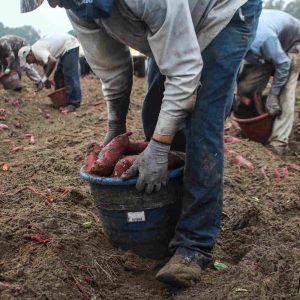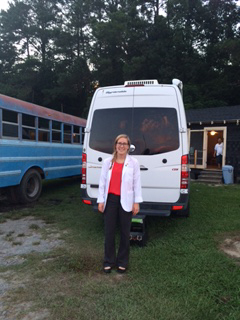Once a week during the spring and summer growing season, UNC physicians, nurses, residents, and medical students travel to Benson, NC, to provide care for the area’s migrant farmworker population.

Once a week during the spring and summer growing season, UNC physicians, nurses, residents, and medical students travel to Benson, NC, to provide care for the area’s migrant farmworker population.


By Jamie Williams, jamie.williams@unchealth.unc.edu
Once a week during the spring and summer growing season, Gayle Thomas, MD, and a group of other physicians, nurses, residents, and medical students make the drive to Benson, NC. Over an hour from Chapel Hill, down a flat stretch of I-40, Benson is a hub of Eastern North Carolina agriculture. Seasonally, it is home to thousands of migrant farm workers who come to pick tobacco, fruits and vegetables. Sun up to sun down, six days a week, the men work. They are away from their families, isolated, living in barrack like structures, built in the fields. The work, the heat, and the chemicals they are exposed to day-after-day cause myriad aches, pains, and health concerns more severe.
That’s where Thomas, and the van, comes in. On those weekly trips, Thomas and colleagues offer free, late evening care, education, and preventive screening services to the workers. The initiative, a joint project between UNC Family Medicine and the North Carolina Farmworker Health Program in the Office of Rural Health, is now in its fourth year.
For the farm workers, it’s vital.
“There are such tremendous barriers to care for these workers,” Thomas said. “They just can’t take the time away from working, and even if they could, they are in a place they are largely unfamiliar with, have little money, and no transportation.”
Thomas and fellow UNC Family Medicine physicians Drs. Evan Ashkin, Ann Mounsey, Tim Daaleman, Narges Farahi and Martha Carlough, along with UNC Family Medicine residents, medical students, and two invaluable volunteer MPCU nurses, Leonora Tisdale and Sarah Manfred, staff the mobile clinic. Together, they see 10-12 patients each week in the back of their van.
“You can do an awful lot in the back of the van,” Thomas said.
The most common ailments make sense, considering the toll of work in the fields. Musculoskeletal concerns are addressed by volunteer Physical Therapy faculty and their students from Campbell University who also come to provide their expertise. There are skin complaints related to sun, heat, and chemical exposure. Sun and dirt often cause eye irritation.
Then, there are issues like diabetes, hypertension, and colon cancer screening. The team from UNC collaborates with community outreach workers to provide education on these concerns, tips on diet and disease management, and screenings.
More serious cases that require resources not available on the mobile clinic are referred to the Benson Area Medical Center, which also provides late evening farm worker healthcare during the agricultural season.
The community partners, especially the outreach workers from the North Carolina Farmworkers Project in Benson, are key to the program’s success, say Thomas.
“We absolutely couldn’t do this without the outreach workers,” Thomas said. “They are the ones who help to build trust with the workers, find the patients, and do all the follow up.”
In addition to providing vital care to this population, the effort also provides educational opportunities to UNC School of Medicine students.
Kristin Sundy, a third year medical student, learned about the clinic as a part of UNC School of Medicine’s CAMPOS program. CAMPOS is an enhancement program for students with a particular interest in caring for North Carolina’s fast expanding Spanish-speaking population. She was the first student to enroll in a new month long medical school elective in Migrant Farmworker Health.
During her time with the program, Sundy would travel to Benson three nights per week, on the mobile clinic she would take patient medical histories. Other nights she would travel to the worker’s camps in the fields with outreach workers, providing health screenings and education, and distributing medication to patients. Through the experience, she learned the value of direct, precise communication.
“All of the information we got was through conversation. In the hospital, you can always do more tests and use those results to show the importance of what we are talking with the workers about. Without those resources at hand on the mobile clinic, it’s all about trust and honest conversation,” Sundy said.
Before she began working with the program, Sundy said she was unaware of the size of North Carolina’s farmworker population and their specific challenges.
Part of the goal of this work, Thomas says, is to raise awareness of the unique needs of this population. It’s also to pass lessons on to learners that will benefit them wherever they end up in their careers.
“This is a parallel world that exists not too far from Chapel Hill and I want our students to be aware of those with different circumstances than them,” Thomas said. “These people are proud of their work, and they deserve care and they are worthy of respect.”
Learn more about the effort by watching this video.